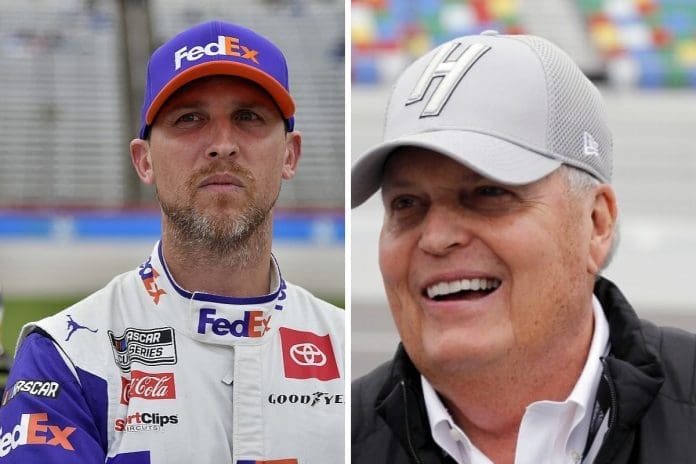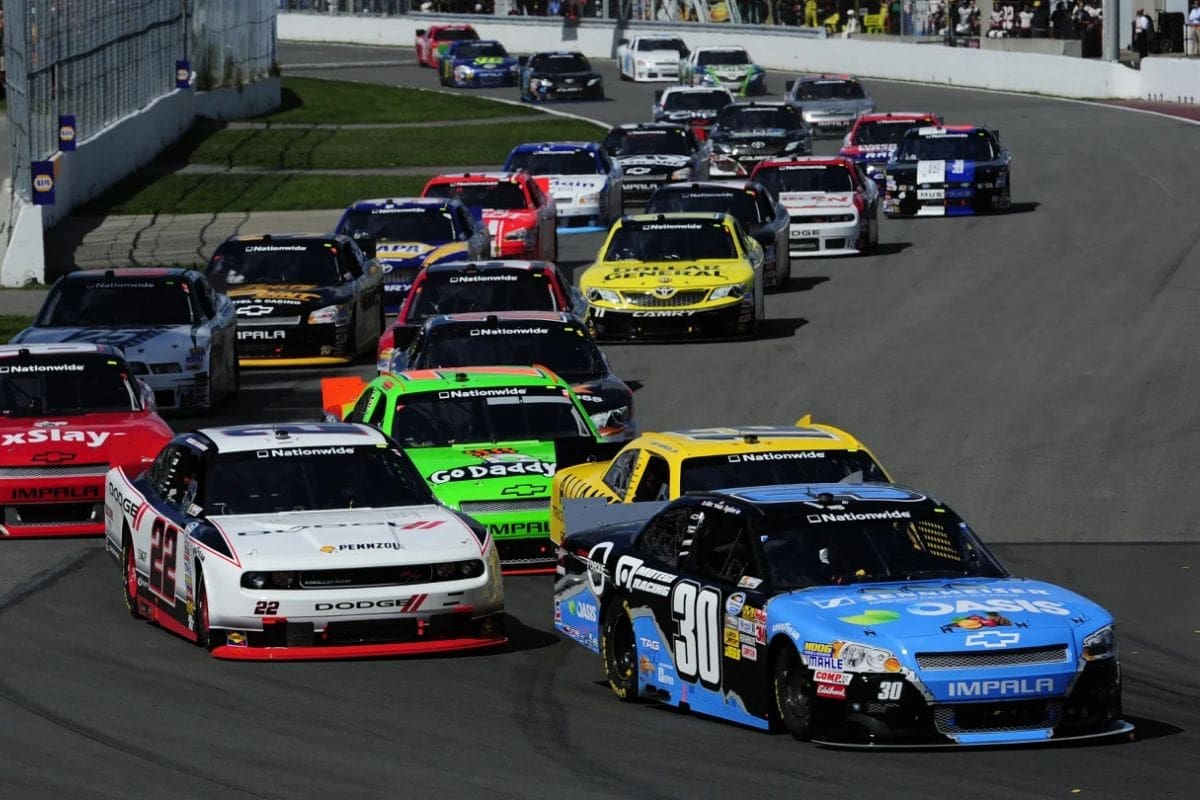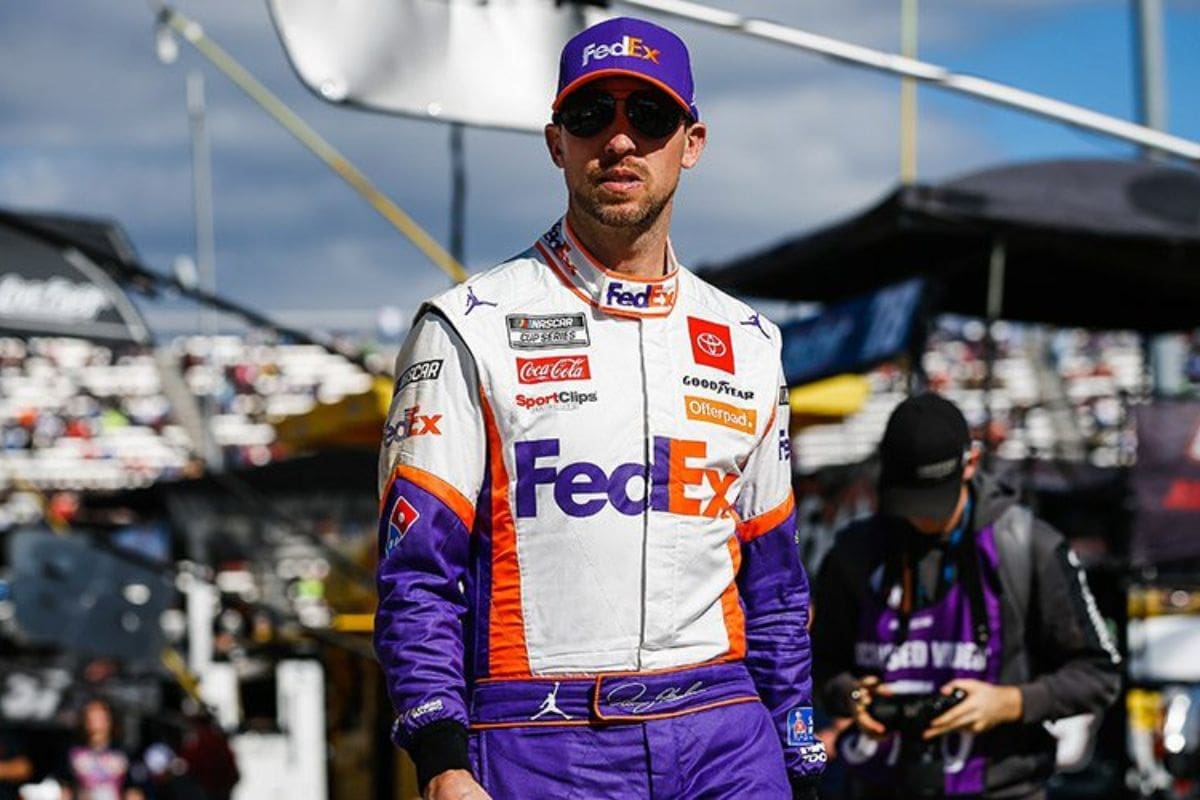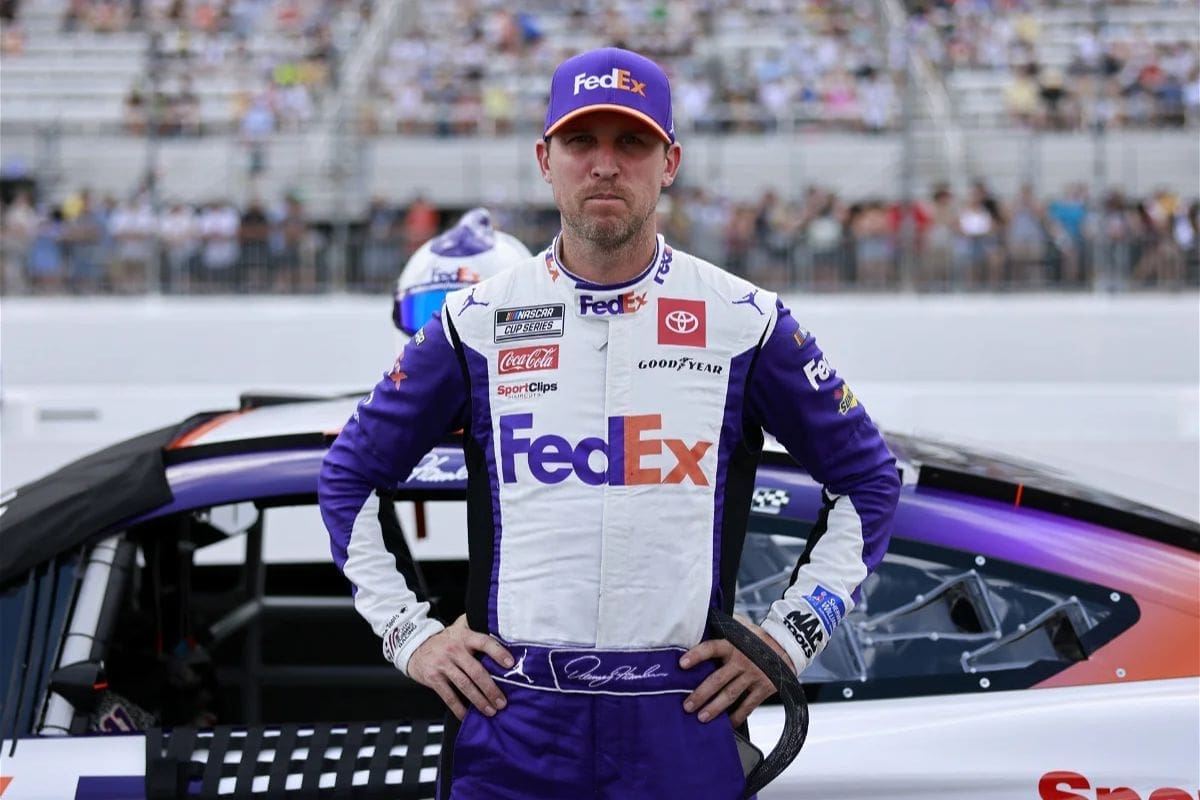Denny Hamlin Exposes NASCAR’s Greed: The recent discussion sparked by Denny Hamlin‘s pointed criticism of NASCAR’s financial practices has revealed a notable divide within the motorsports industry. Hamlin’s statements regarding NASCAR’s imbalanced revenue distribution, which he alleges favors the organization over its teams, highlight a systematic financial imbalance. This issue is aggravated by Rick Hendrick‘s urgent plea for financial assistance, showing the serious economic challenges faced even by top-tier teams. Jim France’s strong refusal to modify the current financial agreements adds complexity, raising concerns about the sustainability of NASCAR’s business model in view of increasing operational expenses and declining financial stability for race teams.
Key Highlights
- Denny Hamlin criticizes NASCAR for financial greed favoring the France family over teams.
- Hamlin highlights structural financial imbalances despite substantial media earnings.
- Rick Hendrick appeals for financial help, stressing the teams’ financial strain.
- Jim France refuses to renegotiate financial agreements, worsening teams’ instability.
- High operational costs and decreasing sponsorships threaten the sustainability of race teams.
NASCAR Charter Agreement Expiration
As the expiration of the NASCAR Charter Agreement approaches at the end of the year, teams are increasingly anxious about the uncertain future that awaits them in the sport. The charter system, which was introduced in 2016, has provided teams stability by guaranteeing race spots and revenue-sharing opportunities. However, the impending expiration brings forth many concerns that threaten to destabilize NASCAR.
One major worry is the potential realignment or even dissolution of existing teams. The departure of Stewart-Haas Racing, a prominent player in the NASCAR ecosystem, highlights the volatility that could occur without a renewed agreement. Teams are left to speculate whether the next iteration of the charter system will continue to provide the foundational guarantees they have relied upon, or if it will introduce new constraints that could make their participation untenable.
Furthermore, the deadline places immense stress on team owners and stakeholders to secure their financial and operational futures. The current agreement’s expiration forces a re-evaluation of long-term strategies, sponsorship deals, and resource allocations. The uncertainty also complicates negotiations with sponsors and partners, who may be hesitant to commit to long-term contracts without clarity on the sport’s structural framework.
The anxiety is noticeable as teams await a resolution. The need for transparent and timely communication from NASCAR’s governing body is more crucial than ever. As teams brace for the potential changes that may accompany the end of the current charter agreement, the sport’s leadership faces an imperative to manage these challenging with prudence and foresight.
NASCAR’s Reluctance to Assist Financially
NASCAR’s persistent reluctance to provide financial aid to struggling teams highlights a broader issue within the sport’s business model, which consistently places a disproportionate burden on team owners. This hesitation to offer assistance, despite the evident financial strain, emphasizes a systemic problem that threatens the sustainability of the sport.
Industry insiders like Denny Hamlin have voiced concerns about NASCAR’s financial structure, which forces team owners to bear significant economic challenges without adequate support from the governing body. The current business model, as Hamlin pointed out, is flawed in its approach, creating financial burdens for those who are the backbone of the sport.
Team owners, including prominent figures like Rick Hendrick, find themselves grappling with rising costs and diminishing returns. NASCAR’s executives, however, seem indifferent to these economic challenges. This casual attitude is not only concerning but also indicative of a larger issue: the disconnect between NASCAR’s leadership and the teams that propel the sport.
For example, despite the dire economic situation, NASCAR has shown little initiative in revising its financial policies to provide relief. Whether through fairer revenue sharing, cost control measures, or direct financial aid, there are several paths NASCAR could investigate to ease the burden on team owners. Yet, the hesitation to take meaningful action suggests a prioritization of profits over the welfare of the sport’s participants.
Denny Hamlin on NASCAR’s Greedy Side
Denny Hamlin has consistently highlighted the persistent greed within NASCAR, pointing to the striking contrast between the sport’s profitable media deals and its reluctance to support financially struggling teams. Since its inception in 1949, NASCAR has remained mainly under the control of the France family. This monopolistic grip has guaranteed that the significant financial benefits derived from different revenue streams, including a recent $7.7 billion media rights deal, mainly favor the governing body rather than the teams that form the backbone of the sport.
Hamlin’s critique emphasizes a fundamental imbalance: while NASCAR rakes in substantial earnings, the economic burden on race teams remains disproportionately high. This is particularly remarkable given that the Frances control the tracks and facilities, leaving independent contractors to shoulder the financial risks associated with racing. Despite the sport’s evolution and the influx of substantial media capital, the structural dynamics have seen little change over nearly eight decades.
Hamlin’s argument is not merely about the distribution of wealth but about the sustainability and long-term health of the sport. By refusing to channel a portion of their substantial media earnings back into the teams, NASCAR’s executives risk reducing the very entities that provide the entertainment and competitive spirit vital to the sport’s appeal.
Financial Struggles of Race Teams
The financial challenges faced by race teams have become increasingly unsustainable, as the gap between NASCAR’s growing revenues and the shrinking budgets of its teams continues to widen. The Race Team Alliance (RTA), initially formed to unite teams and streamline costs, has found itself in a confrontation with NASCAR regarding this evident financial imbalance. Their concerns are well-founded; while NASCAR’s overall income has reached peak levels, the economic burden on the teams has risen, fueled by decreasing sponsorships and ratings.
Denny Hamlin, co-owner of 23XI Racing, has been particularly vocal about the financial obstacles that race teams face. During his appearance on Kenny Conversations, Hamlin vividly portrayed the contrast in NASCAR’s financial environment.
“Over time, sponsorship and ratings declined a little bit, and the teams were the ones that felt the most pressure…salaries got cut, and everything got cut…All while there was record revenue going into our sport.” Hamlin observed. This strain has materialized in various ways, including salary reductions and budget cuts, highlighting the financial instability faced by those who maintain the sport’s competitive edge.
The core of the issue lies in NASCAR’s charter system, which many team owners, including Hamlin, argue worsens their financial difficulties. The current revenue-sharing model seems out of sync with the operational realities of the teams, who bear the impact of economic downturns and changing sponsorship landscapes. While NASCAR’s revenue streams expand and diversify, race teams are compelled to go through a financial terrain filled with uncertainty.
Economic Challenges and Potential Losses
Financial instability within race teams has reached a critical point, intensified by the escalating costs associated with operating in NASCAR’s current economic landscape. Denny Hamlin’s disclosure about top-tier teams, including those led by Rick Hendrick, appealing to NASCAR’s leadership shows the seriousness of the financial strain.
“Over the last few years, big team owners have gone to Jim France and said, we need help. Our teams are dropping like flies…we’re championship teams and boom, we’re out of business. How can we stop this? You guys are doing really really well and we’re struggling to break even and not lose millions of millions of dollars.” – (hamlin)
These appeals, however, have been met with a firm refusal from Jim France, who insisted that teams must adhere to the financial agreements made in 2016, despite the dramatic changes in economic conditions since then.
“They received back quite simply, Sorry you cut your deal in 2016, and you’re gonna live by what that deal is…Nope, ain’t gonna do nothing for you.” – (hamlin)
The financial challenges are multifaceted. A prime example is the prohibitive cost of getting a car on the track, which stands at $18 million before driver compensation. Expenditures do not end there; the introduction of the Next Gen car has further strained budgets due to the high cost and low durability of its single-source parts. In addition, the skyrocketing charter prices, exemplified by Spire Motorsports‘ $40 million acquisition, further burden teams financially.
The cumulative effect of these costs is severe. If NASCAR continues to overlook these pressing issues, projections indicate that teams could face losses amounting to $200 million over the next five years. This financial drain is further compounded by the sport’s intricate system, which perplexes potential sponsors, thereby stifling new revenue streams. Without intervention and a re-evaluation of the financial framework, the sustainability of these race teams remains in doubt, threatening the very essence of NASCAR.
News in Brief: Denny Hamlin Exposes NASCAR’s Greed
The financial discord within NASCAR, highlighted by Denny Hamlin’s critique and Rick Hendrick’s plea for financial support, reveals a pressing need for structural reform. The refusal by leadership to renegotiate financial agreements worsens the economic challenges faced by race teams, threatening the sport’s viability.
Addressing these financial disparities is crucial to sustaining competitiveness and ensuring the long-term stability of NASCAR. Without intervention, the economic strain on teams may lead to substantial losses, reducing the sport’s future.
ALSO READ: Denny Hamlin Offers Exclusive Look Inside 23XI Racing Headquarters




